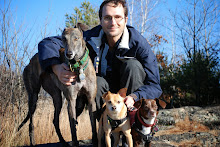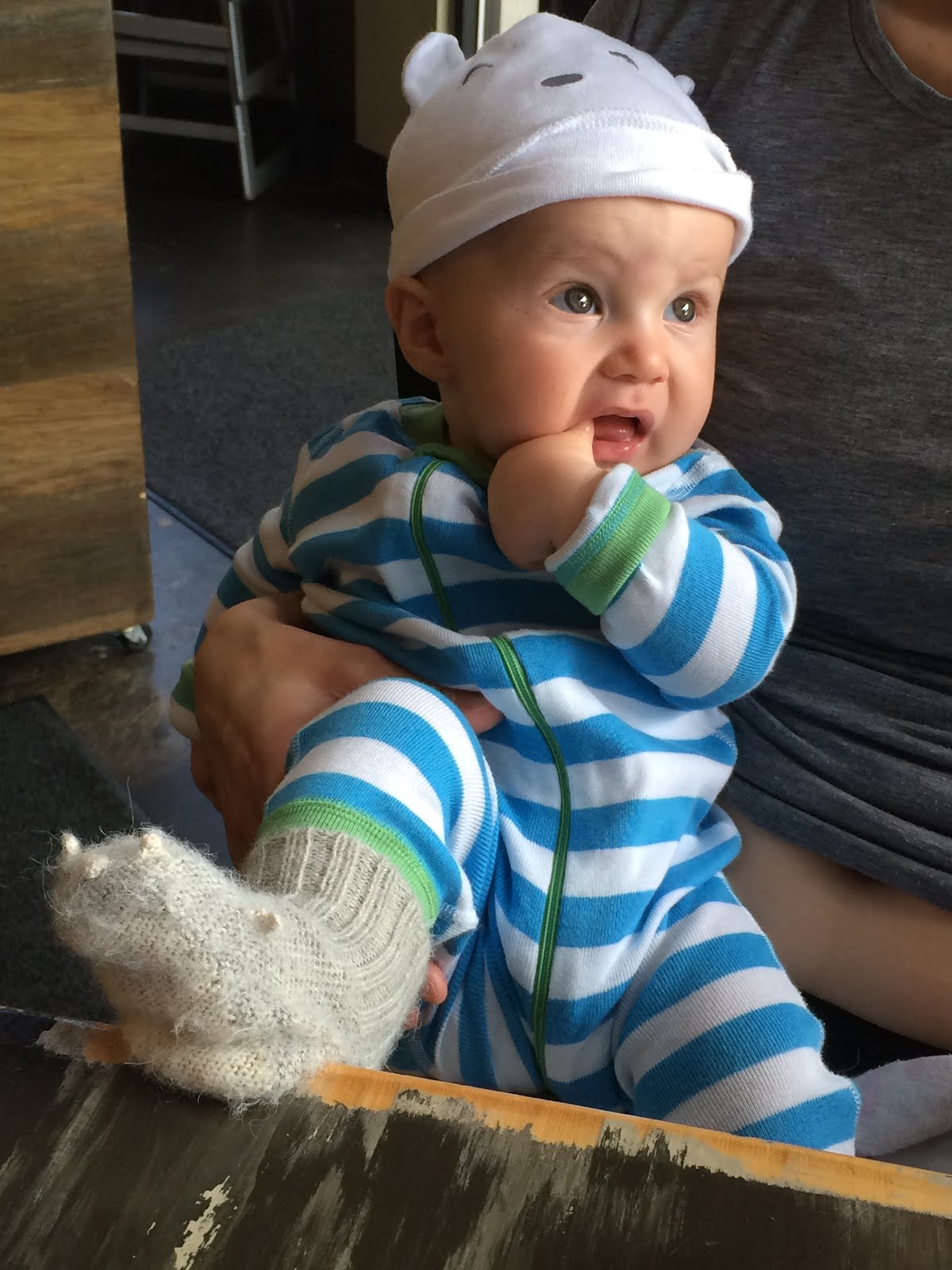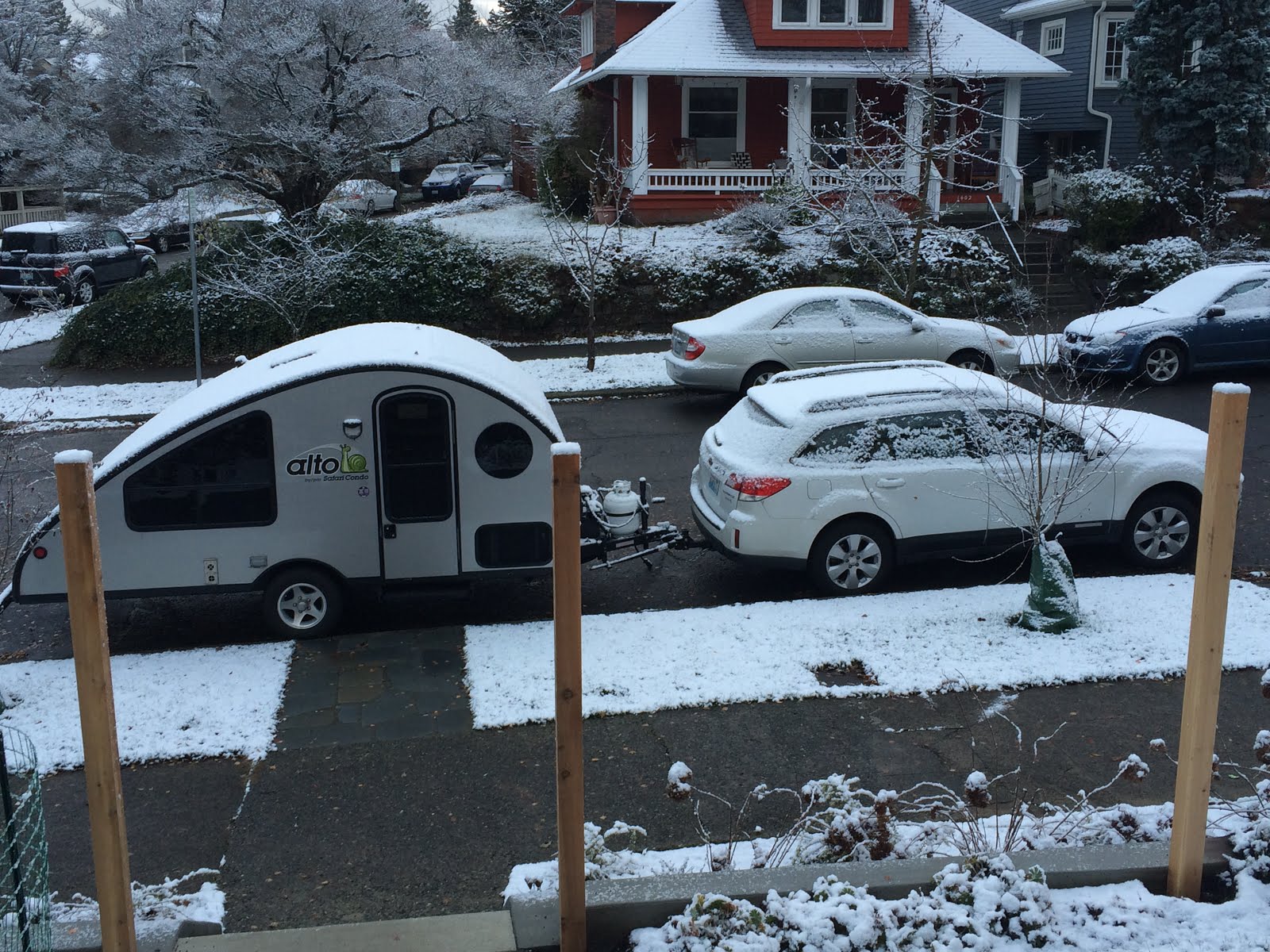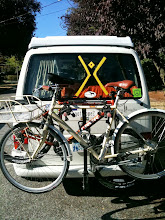We
had a plan. And it was a good plan. But babies, and bodies, and hospitals, and anesthesiologists have a way of messing with even the most well-thought-out and adaptable of plans. No I wasn't in labor for 115 hours. But when we emerged from the hospital,
days after we had entered, it felt like we'd been in a cave-like vortex of nurses, midwives, doctors, the screams of other laboring soon-to-be-parents, and it was as if the hospital itself re-birthed us into the middle of a gorgeous spring day, and it was such a surprise that the world had continued to spin while we undertook the immense task of Getting The Baby Out.
I'm a very healthy person. Always have been. But during pregnancy I developed a condition called thrombocytopenia, aka: low platelets. Really low. And dropping. (Platelets are what allow the blood to clot, so that you can stop bleeding.) By our due date, many typical delivery tools were unavailable to me, specifically an epidural if I wanted it (I didn't), and a cesarean with anything other than full anesthesia (I
really didn't want that.) It also meant many commonly used methods for assisting a stubborn baby, like a vacuum, were off the table because we didn't and couldn't know
her platelet count.
And then, at 40 weeks and 5 days, my platelets took a sudden, albeit small, jump
up. My favorite law professor once told me, when his wife was pregnant with their second child and he was beside himself with fear, that childbirth is the most dangerous thing an otherwise healthy young woman ever does. When you're talking about a, let's-face-it,
bloody enterprise, the ability to clot is quite relevant. So we decided to induce labor. That day. Which was Thursday.
We called the doula. We emailed our parents. I talked to my sponsor. I checked in with my best nurse friend who agreed, "You go get that baby out.
Now!"
I'm going to get specific here.
You've been warned. Thursday evening we checked into the hospital room that we would call home for the next
six days. Our midwife inserted a Cook catheter, which is a small device with two empty balloons that is inserted with one balloon inside and one outside the uterus. The balloons are then filled with saline until they each expand to a diameter of 5 centimeters. The physical pressure for a sustained period (overnight, in my case) dilates the cervix. Other than the fact that the procedure sent me screaming into contractions for about an hour while my body was adjusting to this foreign object, the catheter was not unpleasant. By morning, it fell out on its own, meaning my cervix was open at least that far. So far, so good ...
We started pitocin. This is a drug synthesized to mimic the natural oxytocin the body releases to start labor. For 10 hours we slowly ramped up the pitocin, from a lowly 2 units all the way to 16 or so. Throughout this, the baby was hooked up to constant monitoring (meaning my belly was strapped with monitors that itched and I was connected permanently to an IV - I could walk around but had to take the rolling stand with me and I wasn't allowed to go beyond the reception of the monitors - I got to know the south wing birth center halls
really well). That day we watched the old version of 101 Dalmatians. We looked out the windows at the flowers. And we walked slow circles in the hospital halls.
My uterus was contracting, but I couldn't feel a thing. Not so good ...
At 9pm Friday, my midwife suggested breaking my water. This posed a risk: once the water broke, the baby should ideally make her exit within about 24 hours. If she didn't come on her own, cesarean would become the only choice. But breaking the water should (and did) speed up and intensify contractions. Now it was
on.
Full labor, full contractions, screaming, moaning, getting in the tub, the whole works. At one point my doula said, "you can do it! It's like running a marathon." And I screamed/moaned/croaked back through gritted teeth, "a marathon is
nothing to this."
Karl and I had been determined to do this without pain medications. We took the class, we hired the doula, we practiced the breathing,
we had a plan. I remember at about midnight calling my AA sponsor to give her an update.
An update! There I was, chatting on the phone in between contractions, pausing when the next one came. We were doing great.
But my body wasn't cooperating. By 5am I was still only about 6 cm dilated, and it had been almost 24 hours on the pitocin. And the pain was really bad.
Indescribable.
The trouble with inducing, we had learned in our birth class, is that, statistically, one intervention is more likely to lead to another (like breaking the water), which is more likely to lead to another (like an epidural), and more likely to lead to another (like a cesarean.) I could see the beginnings of this road laid out before me. If I had been further along, like 8 or 9 cms, I might have endured the pain. But at 5am I still had
so far to go. I wanted the epidural. Karl had been prepped to say no, to suggest other tools to manage the pain. But I was beyond
managing. The pain by itself was bringing me in and out of consciousness. I remember at one point the midwife Mary Lou practically on top of me while I lay on my side screaming and crying through a contraction. She said, loudly, right into my ear, "I
know, it
sucks!"
The risk of the epidural with low platelets is bleeding into the epidural space, which is in the spine,
leading to paralysis. I was terrified. The decision to induce balanced the slight rise in platelets, making an epidural at least possible, with the increased likelihood of needing one. But given all this, and the sacrifice of my dreams of an unmedicated labor, I had to have this thing. At 5am.
Trouble was, the anesthesiologist was busy with some woman down the hall (who we had heard screaming through her own unmedicated labor, only to need some kind of emergency surgery after her baby was born). We had to call in another one. And he didn't arrive for 2 hours.
Two
hours. Anyone who has been through labor knows what this wait was like. Words cannot do it justice. I asked to shut off the pitocin. Then I opted for the most undesirable of options just to get through it: the narcotic, fentanyl, introduced through the IV. I made them give me only a half dose. Thank goodness I had discussed all of these possibilities with my AA sponsor, never thinking they might actually become reality. I barely felt the narcotic. What it did, however, was cover me long enough until the anesthesiologist was at least on the premises, and then I gritted my teeth until he appeared.
Nobody liked this anesthesiologist. The room was full of a few nurses, one or two midwives, the doula, Karl, maybe even an obstetrician, I'm a little fuzzy on the details. The anesthesiologist ran through the risks, talked about the needle and the procedure, but not very warmly. Not warm at all, this guy. I didn't really mind; I'm a lawyer and understood CYA, which is what he was doing. Bedside manner was the least of my concerns.
For the epidural I sat on the edge of the bed, with my gown open at my back, leaning into one of the nurses, the nice, tall one who held me in a big hug throughout this procedure. She was helping me stay still. Flinching would not be good. I was so scared, more than at any other time through this whole birthing thing. I remember looking at Karl, eyes wide, wondering if I had walked my last steps in life.
When the needle was done, they laid me on my back again and my blood pressure dropped. I had always received good health marks for my low blood pressure. Frequently 100 over 70, 90 over 60, that sort of thing. I don't know what it was dropping to, but the anesthesiologist wasted no time with his next action: rummaging his kit, opening something, grabbing the IV cord and injecting it. I remember wondering if Mary Lou knew what was happening and if it was okay. Nobody was talking.
Ephedrine, they told me later. Great, I thought, same family as meth. Just what I want. A few seconds later, my chest, my chest was tightening! I was grabbing towards my heart, I was flat on my back and vomited, now I was choking. I couldn't roll myself over or sit up because of the anesthetic. So much terror! They rolled me on my side. It gets a little blurry for me here. I think they may have given me some other medication, maybe something for the anxiety, the tightening. Whatever it was, this whole experience was the worst! It felt like my body was fighting every step of the way.
Once the anesthesiologist left, everybody started complaining about him, but I just kind of rolled over as a blob. The pain was going away. It had been done, and there wasn't any undoing it now.
They restarted the pitocin, and really ramped it up. I had been contracting throughout the wait, but the contractions had slowed down and gotten further apart. From this time on, I just kind of lay there, now unable to walk, even to the bathroom. Now I was really
a hospital patient. Complete with urine catheter. It was Saturday morning.
In the beginning of our stay, I wouldn't let the nurses and staff do much for me. I changed sheets myself, folded my own towels, tidied up the room. Now, I pushed the button for every need, small and large. To pick up a pillow. To untangle me from IV cords. To bring me ice. (Oh, yeah, food was withdrawn once the epidural occurred, making my last calories at 8pm Friday night. Except for my bandit Coca-Cola ... Karl would allow me, reluctantly, a few sips when I really begged.) Total helplessness on my part. Ugh.
As the hours wore on I was vaguely aware of the change in nursing shifts. They stopped telling me the pitocin level but I heard something about special permission to go above 30 units. I encouraged Karl to take a nap. Jenne, our awesome doula, disappeared for a while for the same thing.
And the epidural wore off. On my left side. At first, I didn't tell anyone. I was actually glad to feel some of the contractions again. I could feel them in a numbed down state, and only on my left side. It was nice to know something was still happening to progress the baby out. This was, after all, about
her.
Eventually, though, I told the nurse. She got the anesthesiologist, a different one now, this time he was a big guy with grey hair from Bulgaria, with a beautiful accent. He increased the anesthetic and my right side went out completely. Couldn't feel my toes, couldn't move a muscle. The left was never all the way gone, but almost. Even so, I could feel the fatigue in my uterus. We'd been in the hospital close to 48 hours and had been running pitocin for nearly 36. As the afternoon wore on toward evening, I felt my insides were just
stressed. Physically overextended. There wasn't any pain or a specific phenomenon happening, it was just an overall sense that my body couldn't take much more of this. I was at 8 centimeters.
During a quiet time, late in the afternoon, when it was only Karl and Jenne with me in the room, I turned to Karl and said, "Do you think we should consult with an obstetrician? I'm worried. This isn't going well. It's not working." Nobody had suggested this to me, and I'd never been through childbirth before. But there was a sense that it wasn't right. And it wasn't going to fix itself.
Within the hour, when our midwife Cindy next came in, she had a look of regret on her face and validated my concerns: "I've been consulting with the obstetrician on call and I think you should talk to her." I knew where this was going. Midwives don't consult with obstetricians unless they really have to. "We're talking cesarean," I confirmed. The doom! This was the last thing we wanted. It was always a possibility, but only that. A last resort. Something to be done in case of emergency. Cindy mentioned that the baby hadn't been descending enough, and she said, "the uterus could rupture." What? "What does that mean?! Rupture? Does it mean hysterectomy?" (Because even as I lay, fearing death and paralysis, it was crucial that I preserve my ability to
do this again.)
"No, not a hysterectomy. But it could split open." Ah, this is what I had been feeling and couldn't put my finger on: my uterus was wearing out. When faced with this reality, what I felt was a sense of relief. "Bring in the OB," I said. Cindy mentioned that the doctor looked like she was 22. I'm glad she warned me! Dr. Oman talked a little bit, she seemed nice, and adequately competent. She checked my cervix and said I was now closer to 9cm dilated. She said she was reconsidering her position and that I might be able to go just a little bit longer and then try pushing. Cindy and the nurse exclaimed with a joy that I did not share. "Then what?" I asked the doctor. "What are my chances?" Pushing can take 45 minutes or 4 hours, I knew. They might need to use the vacuum on the baby's head but this was still not a possibility for our baby. My uterus was in a weakened state. "I could get her further along and still need a cesarean, right? What then?" The doctor nailed it for me: "It will be worse to do the cesarean later." Worse for me, worse for the baby, a more difficult procedure, done under emergency settings.
No, I said. Now.
It still makes me cry. The giving up of the plan. It was more than a plan, it was a rite of passage, literally, for the baby and me. Gone. Not happening.
I called my sponsor Laura. I didn't actually remember doing this until Jenne reminded me a week later. Laura later told me I sounded really calm, that I was scared but lucid. "The nurses are doing something to me, I guess I have to go," I told her before hanging up. Once we put this decision into motion, things moved quickly. The lovely Bulgarian came back. He stood by my head and told me what would happen. "You won't leave me, right?" I asked him. "I'll be there the whole time," he promised. And indeed it was his hand that I held during the surgery, his voice that was the most constant.
They wouldn't let Jenne in the operating room. Karl started putting on the blue hat and gown. It was so very
medical. They had me drink a brown liquid, telling me to hold my nose and chug it. I did and started vomiting almost immediately. By now I'd learned to turn my head to the side
ahead of time. (Ironically, it was an
antacid intended to calm my stomach
.) They wheeled me a short distance down the hall and through the dark, foreboding double doors.... I vaguely wondered if any other laboring women were wandering the halls thinking, "I'm so glad that's not me."
Karl was kept out for a few minutes. Long enough for me to vomit again, and explain to the nurse who introduced herself as the baby's nurse that Karl was my health care power of attorney and that I
forgot the paperwork. "Don't let me die on this table where the last thing I consciously do is vomit over the side." In my mind I was really articulate and clear. Who knows? But she treated me with so much respect. "Yes, I understand," she smiled. And despite all, my humor was not altogether gone, "This is just the fastest route to a Coca-Cola," I explained.
The procedure is really fuzzy for me. Karl came in, and sat to the left of my head. The Bulgarian was behind me on my right. Cindy was there, assisting the doctor. I didn't feel the cutting. Someone said, when they got through the uterine wall, that the baby was face up. What I remember most vividly was Cindy joyfully exclaiming, "Oh, it's such a big baby!" And I waited for what every mother out there knows I was waiting for: the screaming. Time reaches implausible depths of slowness when a new mother waits to hear her baby scream. No matter how many people were in the room, no matter what anyone was saying or doing, I was waiting for one sound, from one, tiny person. And then I heard her. A cry more than a scream. A sweet, sweet cry. It was 6:55 pm Saturday.
I hadn't seen her yet, they took her to the left, behind Karl. I was waiting on the weight and the APGAR scores. Nine pounds, someone said. They brought her to me and laid her screaming, red, squirmy, weird newborn little body on my chest. "I don't know how to hold her!" was followed quickly by "What was her APGAR?" They told me 9 and I demanded what she had missed: "slightly bluish hands and feet," they reassured me (the most common one.) I was flat on my back, with bizarre levels of anesthetic and who-knows-what-else coursing through me. I held her awkwardly for less than a minute; this time they say is so important for the baby to bond, to feel her mother's warmth from my chest specifically designed to provide it, yet I made them take her back. I couldn't hold her.
Karl and I had a plan for this, we just didn't think we'd need it: Eyes On The Baby. Karl was to stay, at all times, with the baby. Forget me, stay with the baby. He told me later his eyes never left her. So he is as fuzzy as I am on what happened to me. I'm glad. I remember the nurses laughing when she exploded her first poop all over him, somehow getting it inside his gown and even down the inside of his pantleg!
45 minutes went by. I was in and out of consciousness. I started yelling that I could feel the pain of what they were doing to me. Later, the doctors would insist that I was merely feeling "pressure," but when they ripped the tape off my belly and I nearly jumped off the table, the nurses knew. I remember someone complaining about my metabolism being really high, messing with the anesthetic, burning through it. You aren't supposed to feel surgery. But I could; and it hurt!
When I came to (and indeed it felt like coming out of an alcoholic blackout, something I never wanted to feel again) I was back in our room, Karl in the rocking chair with our baby. In my delirium I insisted we call our parents. "Call my mom!" He brought the phone, placed it near my head on speaker and we called my mom, who, terrified upon hearing my weak, croaky voice that I imagined was perfectly clear and audible, probably thought I was dying. Karl did the talking after that. Next I had him text the first pictures to our friends; I was rattling off who should be included, forgetting several close friends. At some point I discovered joyously that I could wiggle my toes.
And there was a baby. All this commotion, all this effort and fear, and medications, and screaming, and planning, and decision-making. There was this little
human.
Madison West Cromwell, born 6:55pm on April 18, 2015. 9 pounds, zero ounces, 21 inches tall.
 |
| 5 minutes after being born! |
She was really good at nursing right away, a true gift because I was in no position to help her much that first night. Mary Lou was back on duty and would sort of smush my breast into a point and mash Madison's face onto it. They had me on heavy duty pain meds all night, and maybe some other stuff, I've been afraid to look at my records. Sometimes Madison would sleep on my chest, held safe by the walls of my bed. For a few hours Karl held her so I could sleep more thoroughly. But I would wake in a panic, look at him in the rocker with her and ask, "You're not sleeping are you?!" I was so afraid he might drop her if he dozed off. But he was awake and focused like a man never was before or since.
By 6am I shut off the pain meds. By 9am I told them I wanted only Advil and Tylenol. They said no,
you need this. Your goal for the day is to stand up for 3 minutes. They
knew I was a recovering alcoholic. I let them turn it back it on. While I had researched the decision-making surrounding a cesarean, so that I felt comfortable if I got to that point, I had gone no further. I had
no concept of major abdominal surgery, or recovery from it.
Importantly, thankfully, joyfully, they let me eat. I had gone 36 hours with only a few sips of illicit Coca Cola and I was famished. We ordered breakfast as soon as the cafe opened and I enjoyed the mother's rush of adrenaline, joy, and energy that lasted all day long. Despite being awake for most of the last 48 hours, and enduring the most physically challenging experience my body had ever faced, I was effortlessly
awake. While Karl slept, so hard that yelling and throwing things at him could not roust the man, I called our parents on Skype and Facetime so they could see their new, first grandchild. I called friends, posted to facebook, and
loved on this child all day long.
That was Sunday. Because of the surgery we stayed in the hospital for several days. This part was so wonderful. The pediatrician on call gleefully exclaimed, "look at these muscles!" We asked the nurses so many questions, they gave us tips we would never have known to ask for. They swaddled her, they helped us hold her, they checked on her day and night. And they took care of me, so much so that by the time we were getting ready to leave, I hadn't realized how weak I really was. I needed to lie down between packing up and actually leaving.
If I were back on that original Thursday when we went into the hospital, I would make every decision exactly the same way, even knowing where it all took us. At 9 pounds and faced forward, at 40 weeks and 5 days, at my platelet level and my body's general unwillingness to let go of this baby, everything went exactly as it needed to, when it needed to.
We stepped out into the broad daylight, April 21st. Tuesday. Madison wearing her dinosaur outfit that we picked out and was too big for her so she wore it over the top of another outfit. The day was so bright for her little eyes, which had been protected by the womb for so many months and the muted hospital room for her first few days of life. On our way to the hospital the previous Thursday, Karl had said it was the most nervous he had ever been while driving. Until the following Tuesday.
As we exited the gates and paid our parking, I asked to keep the ticket. 115 hours, I calculated. 115 hours to change your lives.






















